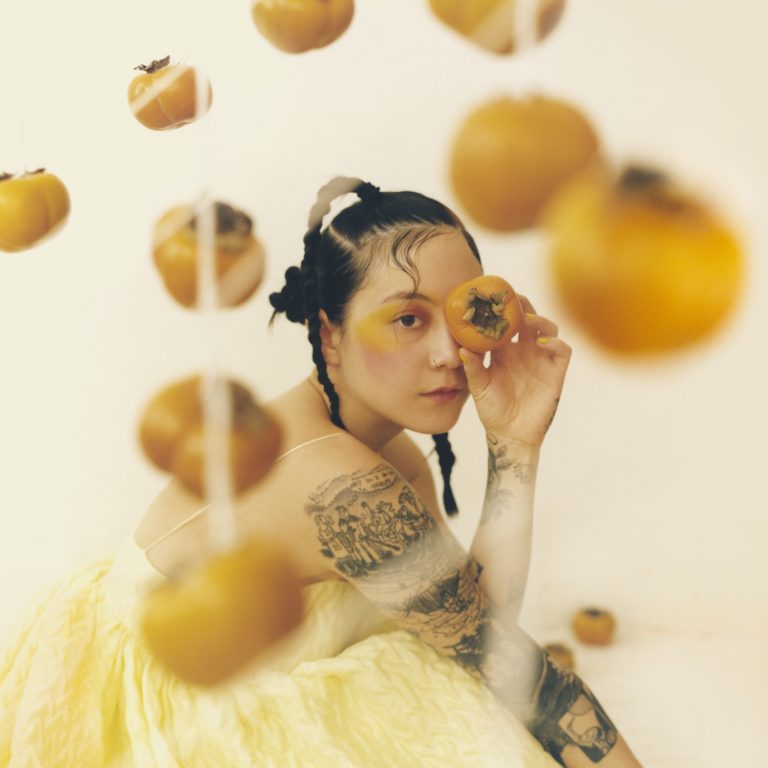Yellow is a funny color. Not because it possesses any promise of instant gratification or anti-depressive quality, even though many an interior designer has touted claims like that. In fact, too much yellow can create a sense of suffocation, just like the joy it’s meant to indicate. That is probably why Van Gogh’s Sunflower masterpieces can at times seem like an assortment of marine alien species heads writhing, and Charlotte Perkins Gilman chose the colour to signify dread and insanity in her feminist masterpiece “The Yellow Wallpaper”. But it’s not just emotionally – metaphorically, it can suggest that there are limits to joy that turn happiness into something sinister, akin to a smile too wide. Never-ending sunshine will ultimately result in a desert.
So, it’s with a bit of disquiet to hear that Michelle Zauner’s third album as Japanese Breakfast, Jubilee, is her ‘happy’ record. Symbolized by the cover image of Zauner surrounded by hanging persimmons and in a flowing yellow dress, it’s meant to be a turn away from the melancholia and heartbreak that shaped its two gloomer pop predecessors. And indeed, Jubilee is a pop album – but things aren’t quite as easy and jubilant as indicated. Sure, there’s the straight Kate Bush influences on “Posing in Bondage” and “Paprika”, but the album is simultaneously marked by a deep sense of longing and tender struggles that complement its palette. Even if intended as a Van Gogh – a work of strong, powerful brushstrokes – Jubilee ends up more of a poetic and carefully-assembled Miro.
Part of that comes in the album’s association with synth pop: lead single “Be Sweet” exists in a disco landscape, but “In Hell” feels more related to Bruce Springsteen’s “I’m on Fire”, while “Slide Tackle” and “Posing in Bondage” reconnect with the dream pop roots of her previous gloomer pop album Soft Sounds from Another Planet. Parallel to that, the album features a set of beautifully composed singer/songwriter tracks, full of strings, brass sections and addictive guitars that could be right off of a Wilco, Bright Eyes or Okkervil River album.
Yet, while there’s still an airiness to the synth washes and Zauner’s breathy vocals, the lyrical content is all but fun. “I want to be good / I want to navigate this hate in my heart” she muses on “Slide Tackle”, “Somewhere better / I want to feel it”, she adds, before diving into the chorus with the lines “Don’t mind me while I’m tackling this void / Slide tackling my mind / This weight feels like / I’m wrestling with my head / Obsessing in the dark.” “Posing in Bondage” finds the protagonist lost in a drunken haze, made up and waiting for a lover who might not even exist. “When the world divides into two people / Those who have felt pain / And those who have yet to […] Posing in bondage / I hope you come home soon.” It’s clear the song characterizes a sense of domestic struggle, the idea that the restraints of a monogamous relationship allow for romantic fulfilment, but, given its surreal music video in which a high fashion vampire toasts friendship with a store worker, it could also analyze an ongoing struggle with prevailing feminine role models in society. The corset of costume ultimately allows for rebellious behaviour.
This tense struggle of inner desire and outer movement marks all of Jubilee. And that shouldn’t be a surprise, given the opener “Paprika” harkens back to the visual of the surreal nightmare parade from Satoshi Kon’s film of the same name. Be it the playful predatory introduction of “Be Sweet” (“Tell the men I’m coming, tell them count the days / I can feel the night passing by like a mistake waiting for me”) or “In Hell”, the companion piece to debut album opener “In Heaven”, which sees the protagonist put the dog from the older song to rest (“Wheeled you and laid on your side / I cried and cried and at my signal / They stopped your heart and then you died”), the moments of resolution on the album barely suggest happy endings. “Hell is finding someone you love / And I can’t feel you” are some of the most heartbreaking lines 2021 had to offer so far.
Judging it from the outside, it would be easy to write off Jubilee as just a triumphant pop album from a young singer songwriter who’s well on track to be the next Aimee Mann or Conor Oberst, but there’s a depth and sensual nuance to the album that most of her contemporaries lack. Where Phoebe Bridgers’ latest work indulged in diary prose to Saddle Creek pastiches and St. Vincent’s struggle with fashion artifice distanced her from her output, Zauner writes short films and tone-poems that don’t need pathos or drag to make a point. They’re both authentic and cinematic, make use of costume (such as the pitched voices and gender switch in “Savage Good Boy”) while also cutting right to the unspoken truth within intimate experiences – what more needs to be said than “Woke from a dream in which you’d left me”?
And, at her best, Zauner doesn’t even need words to evoke these emotions: the closer “Posing for Cars” ends on an extended guitar solo (a spiritual reference to Jeff Tweedy’s solo on “At Least that’s What You Said”), which is nothing short of breathtaking in its longing, distorted wails demanding tenderness. It’s the type of performance that can make a listener cry, no matter what side of the story they find themselves on. Maybe that’s what makes Jubilee so special: only Zauner could have fashioned these songs both as tenderly bright and violently sad as they’ve become. Not one colour: an entire spectrum of female experience, struggle and fulfilment.

